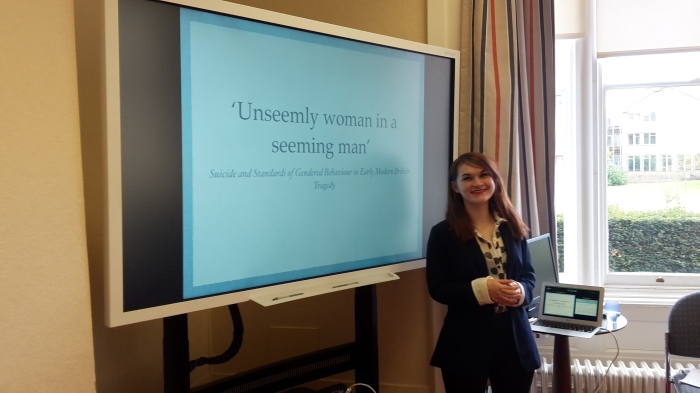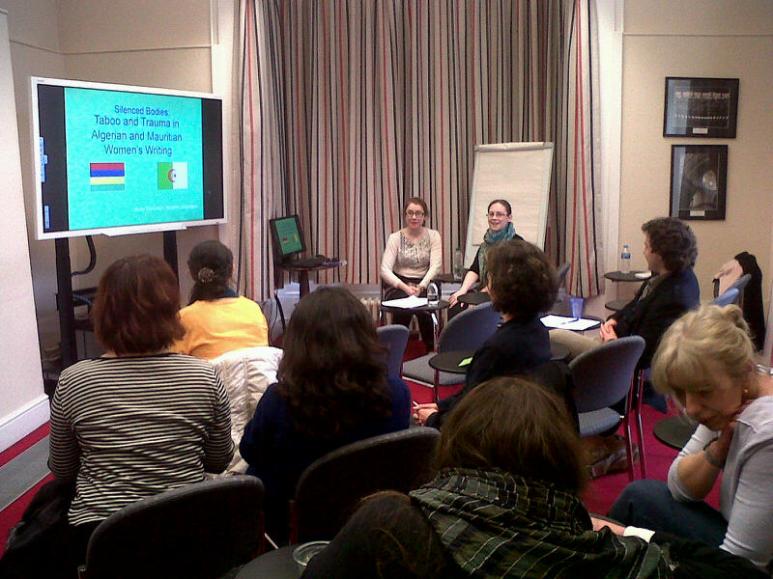One of the reasons for creating this blog was for us to discuss issues relating to gender and sexuality. As well as reporting on our meetings, we would like for this blog to be a platform on which we and you can write on the subject of gender and sexuality. If you would like to write for us, please let us know.
Below is the first in what we hope is a number of articles that will be posted on this site on gender and sexuality related topics. The author of this article is our co-organiser Maria Tomlinson who asks… ‘Why are periods such a taboo?’ The opinions held in the article below and completely hers (bar the theorists etc. to whom she refers) and she hopes you find it insightful yet entertaining.
You may remember in March the controversy over a certain photo on Instagram. Photographer Rupi Kaur posted a photo of a girl lying in bed wearing pyjamas with a menstrual bloodstain on both her tracksuit bottoms and on the sheets. Instagram removed this photo twice as the powers that be deemed it to be offensive and too graphic. When one in two of us in the world have to live with periods every month, and it is a completely natural biological process, why did Istagram try to forbid the user from displaying this photo? More importantly, why did many of the people who viewed this photo react to it with disgust? (Even I myself felt a slight repulsion towards it).
Well, in Western society the idea that periods are polluting, contagious, and should be kept out of sight goes all the way back to biblical times. In the Bible the menstrual taboo manifests itself in Leviticus. In this book, it is suggested that women be ‘put apart for seven days’ (Leviticus 15:1) when they are menstruating and that their husbands must not approach them for sexual activity during this time. It even states in Leviticus that if a man ‘lies with a woman’ on her period they should both ‘be put apart among their people.’ (Leviticus 20:18) Therefore, according to the Bible, a menstruating woman is taboo to her husband especially because going near her may lead to both of them being banished from the community – a pretty serious punishment! This menstrual taboo also exists in other religious texts such as the Qur’an, which forbids a menstruating woman from praying, fasting, and entering a mosque, and also in various Hindu scriptures, which insist that a menstruating woman must not handle food that others will be eating or even do housework (this may be a nice break perhaps). All of these restrictions reinforce sexual difference and women’s subordinate position in society.

Some feminists think that the idea of PMS is a patriarchal construct devised by medics in order to keep women in their places by painting the female body as deviant. The thinking behind this line of argument is that men feel threated by women (why wouldn’t they, we are pretty awe-inspiring) and want the inconvenience of menstruation to stop them from advancing in their work place. I don’t agree completely with this view point, but I am sympathetic to Dale Spender’s declaration that menstruation ‘would have been the locus for glorification had it been the experience of men.’ (See ‘Defining reality: a powerful tool’ in Language and Power, eds. Mureil Schulz et al) The Bible states that semen is only polluting for one day, yet menstrual blood is polluting for seven days. Of course, there is no explanation as to why. Perhaps if women had written the Bible, it would have been the other way round. It is unsurprising, then, if we bear in mind the religious traditions upon which our societies are built, that we treat periods and their representation with such aversion and despondency. We fear contamination and pollution, and therefore images such as that which appeared on Istagram provoke in us a sense of horror as if our mere gazing upon the menstrual blood of another may infect us.
In fact, our reaction to this blood is what feminist and post-structuralist theorist Kristeva would call ‘abject’. Kristeva mentions periods as one of the many bodily discharges, such as excrement or pus, which incites an abject reaction in those who witness it. According to Kristeva, the reason why menstrual blood revolts us is that it reminds us of the fleshy boundaries of our bodies and by association our mortality. Because of our disgust for anything that reminds us of our animalistic nature, we try hard to not think about the materiality of blood and try extremely hard to hide the fact that we are bleeding. This is evident when we contemplate that girls are taught about menstruation at school in terms of hygiene and how to conceal their menstrual flow from others. Menstruation is rarely described in a positive light (e.g. “It means you are fertile – hurray!”). Often a mothers only gives her daughter information after the onset of her first period, but again this is usually only about how to remain clean and how to disguise the fact that she is menstruating (“Don’t let any boys see you with sanitary equipment”). Adverts are also a testament to the fact that we view periods as abject because adverts also emphasise concealment. Furthermore, when commercials show you how absorbent their tampons or sanitary towels are (you are probably slightly perturbed when reading me clearly mention such things – oh the horror) they use a blue rather than a more representative red liquid. Perhaps this is more to do with society’s fear of blood or its association with death, but it also represents our discomfort when thinking about the reality of our bleeding. Another evidence of our refusal to think about the reality of monthly bleeds is our reluctance to speaking directly about menstruation, we feel the need to refer to it euphemistically as our ‘time of the month’, ‘having the painters in’ or ‘the communists are coming’ (perhaps some wish they were after the Conservatives were re-elected) etc.
So that is a brief look at why in this day and age when we are becoming more and more open about sex (less so if you are British maybe), yet we still feel ashamed to talk about such a natural and not at all scandalous biological process that many of us experience. So women, stop beating about the bush when you need a feminine hygiene product because aunt Rose is visiting. Let’s stop feeling ashamed about the fact that we menstruate, use the word ‘period’ in front of other females and males (they’ll get used to it eventually too), and educate our children about the wonders of being a woman (bleeding and all). Then maybe just maybe one day the taboo will finally be completely broken. Happy Menstruating!

